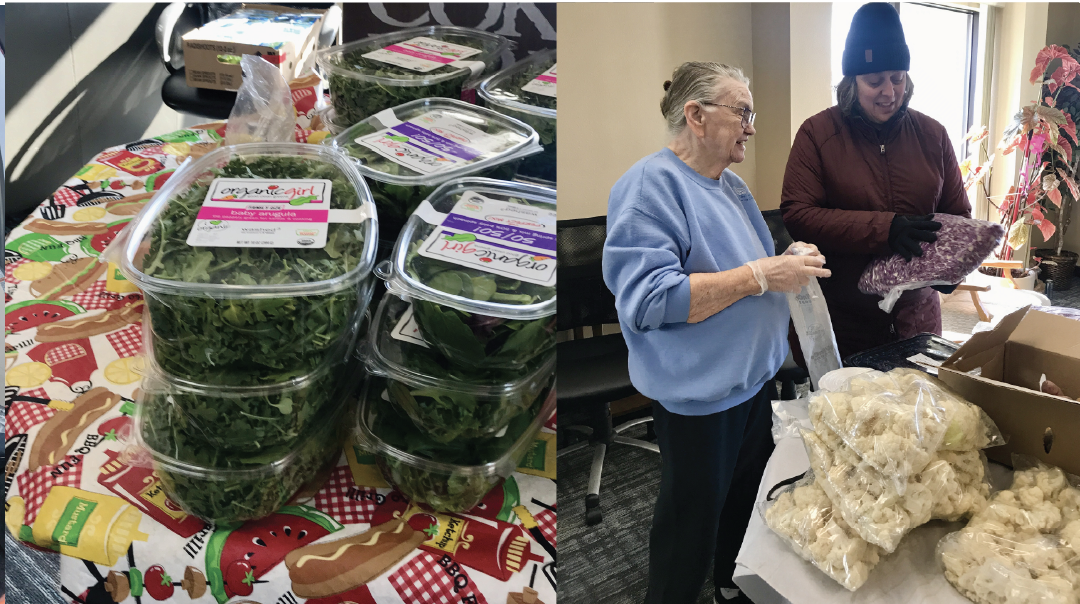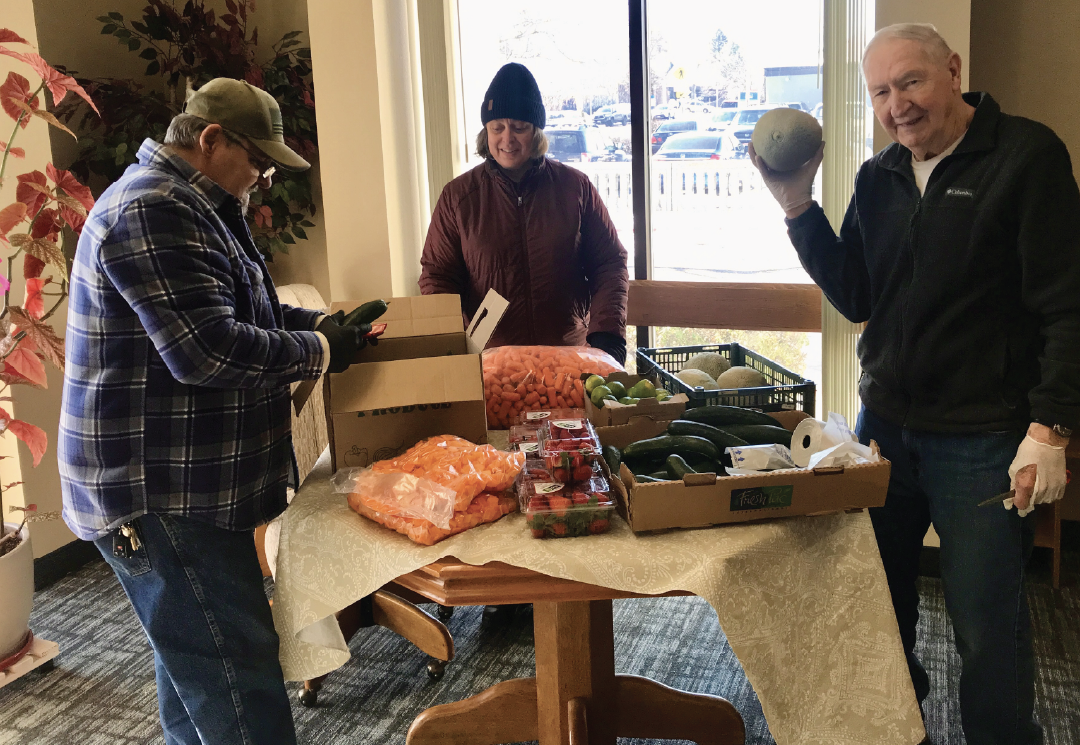Rolling Tomato’s Resourceful Impact
By MaryK | TVCGCoop Co-Founder
February 11th, 2025
Rolling Tomato is an incredible resource—not just for schools, but for whole families, low-income communities, and senior residences. On our ride-along Monday, February 10, we delivered fresh produce to a community of 180 senior residents and then to the Davis St. apartments, where a community pantry supports residents of NeighborWorks’ apartment complexes.
Through her work with community schools, Julie D’Agostino has observed the careful attention school staff pay to students. “If a third grader is food insecure, their whole household is likely struggling,” she noted. In one instance, she saw staff discreetly helping a student find warm shoes and socks as the weather turned cold. “They asked her what color socks she liked—it was about dignity. That’s what we want to bring with food access, too.”
At Charlie’s Produce
Julie first got involved in food recovery in California. “A friend of mine was really instrumental in setting up a new food recovery nonprofit,” she said. “They needed a couple of drivers. At the time, I had a flexible schedule, so I said, ‘Put me on the list. If I can fill in, I will.’” What began as a simple act of service quickly grew into something more as she saw the impact firsthand. “It was easy for me, but it made a real difference.”
When she moved to Boise, she saw a gap—many organizations were working on food access, but no one was doing quick food pickups and drop-offs at scale. That’s where Rolling Tomato came in.
From Charlie’s to our first stop. Including carrots, green and red cabbage, watermelon, and coleslaw mix!
Building Strong Community Relationships
Rolling Tomato has built a strong reputation for resourcefulness and impact, efficiently recovering surplus food and ensuring it reaches community members who need it most. Over time, they refined their approach, building relationships with businesses, schools, and nonprofits to make food recovery efficient and scalable.
One example of their impact is their work with Whittier Elementary School, a community school with a fantastic garden. Instead of multiple, small deliveries across several locations, Rolling Tomato now coordinates food distribution through one central school, where staffers can efficiently organize and distribute fresh food to families. “That way, no one is stuck with extra zucchinis at a school far off while another school runs out,” Julie explained.
Fresh options for our Senior community. A discussion about sweet & sour red cabbage ensues! Shown here: Individual salad mixes (very popular), and pre-cut cauliflower.
Addressing Food Donation Concerns
One challenge is getting businesses to donate food. Many worry about liability—“What if someone gets sick from food we donate?” Julie reassures them that commercial kitchens already follow strict food safety standards.
As an example scenario, if a restaurant made too much of the wrong soup for the night and offered it for pick up she would say, “I can’t take hot food directly off the line,” and then clarify. “But if you cool it down properly, I can pick it up tomorrow.”
Until the Bill Emerson Good Samaritan Food Donation Act was supported on the federal level in 1996, “Private companies [were] too often faced with different state laws governing food donation. These differences can stand between a willing donor and a needy family.” This law effectively protects food donors and recovery organizations and promotes food recovery. This flexibility makes it easier for businesses to participate in the important work Rolling Tomato is doing.
Small carrots, cucumbers, melon, strawberries, and pre-cubed squash. Guess which one’s a favorite!
2024 Impact and Growth
Last year, Rolling Tomato recovered over 200,000 pounds of food, about 85% of which was fresh produce. The estimated value of that food was over $800,000—and they did it as an almost entirely volunteer-run organization.
However, the organization has outgrown its current infrastructure. “We’ve outsized what we’re doing with the infrastructure we have. It’s time to build a bit more, through staffing and partnering with a commercial kitchen or storage space that’s appropriate for food.” Rolling Tomato is now looking for funding to sustain and expand its operations beyond grants.
Parallel Growth & Lessons for TVCGCoop
Julie started Rolling Tomato as a personal project, working on it when she could, in order to prove that it could work before seeking financial support. She built the structure, organized labor, and delivered food consistently—all before she ever got paid for her own work.
Our organization, TVCGCoop, is in a similar but distinct phase. As co-founder I have been maintaining and growing this network while balancing full-time work in sustainable agriculture, via online and wholesale channels. From the start, the whole grassroots organization has seen the incredible pooled knowledge and resourcefulness of local gardeners, the way collaboration evolves each year, and the efficient problem-solving that happens in community gardens. However, we haven't had the people power to celebrate and share those stories as often as they deserve—to hold the spaces that allow this essential knowledge to be exchanged more regularly.
Both organizations are working to support at-risk members of our community. TVCGCoop focuses on preserving gardening knowledge and skill sets, ensuring that community gardens can continue offering experiential learning opportunities to school-aged people who want to grow vegetables. An aim of this organization is to bridge the gap between generations of gardeners and provide kids with ongoing access to these spaces, where they can see a substantial amount of food being grown right here in the valley—by people they either know or can get to know with their families.
We can look to prior generations for proof that community gardens work, from Victory Gardens to today. TVCGCoop is interested in learning, sharing resources, and developing a scalable, sustainable model for shifting circumstances. Meanwhile, Rolling Tomato provides a strong example of how to efficiently recover and redistribute food, demonstrating a system that works while we focus on the essential practice of growing more food and sharing that knowledge.
Shared Goals
Food Access & Equity: Both organizations focus on making fresh food available to the community.
Reducing Food Waste: Aligning on strategies with community partners to minimize gaps in local food systems.
For some gardens, working with partners to reduce food waste could be an opportunity for developing incredible compost systems and regenerative soil health. A worthy goal to work towards!
Building Local Networks: Engaging businesses, schools, and volunteers to strengthen community food resilience.
Education & Awareness: Sharing knowledge about sustainable food systems, recovery methods, and composting best practices.
This is about community-driven food security. As food access and sustainability efforts continue to evolve in the Treasure Valley, there is great value in learning from organizations like Rolling Tomato while TVCGCoop explores creative ways to ensure fresh, local food reaches those who need it most.
Fresh produce a lot of people look forward to.




